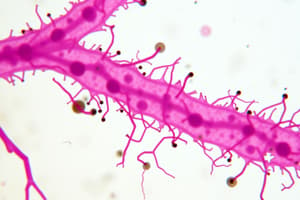Podcast
Questions and Answers
Which of the following is an example of a chemoautotroph?
Which of the following is an example of a chemoautotroph?
- Photoheterotroph
- Methanogens (correct)
- Plants
- Saprobe
What is the main difference between autotrophs and heterotrophs?
What is the main difference between autotrophs and heterotrophs?
- Autotrophs obtain energy from sunlight, while heterotrophs obtain energy from chemical sources
- Autotrophs use inorganic CO2 for energy, while heterotrophs use organic carbon for energy (correct)
- Autotrophs obtain energy from chemical sources, while heterotrophs obtain energy from sunlight
- Autotrophs use organic carbon for energy, while heterotrophs use inorganic CO2 for energy
What is the process called when water diffuses into the cell and solute diffuses out?
What is the process called when water diffuses into the cell and solute diffuses out?
- Isotonic
- Hypotonic (correct)
- Hypertonic
- Osmolysis
Which of the following is an example of a passive transport mechanism that does not require ATP?
Which of the following is an example of a passive transport mechanism that does not require ATP?
What are the two types of essential nutrients based on the amount needed?
What are the two types of essential nutrients based on the amount needed?
Flashcards are hidden until you start studying
Study Notes
Autotrophs and Heterotrophs
- Chemoautotrophs are organisms that produce their own food using energy from inorganic compounds, an example being nitrifying bacteria.
- The main difference between autotrophs and heterotrophs is that autotrophs produce their own food, whereas heterotrophs obtain their energy by consuming other organisms or organic matter.
Transport Mechanisms
- The process called osmosis occurs when water diffuses into the cell and solute diffuses out.
Passive Transport Mechanisms
- Simple diffusion is a passive transport mechanism that does not require ATP.
Essential Nutrients
- The two types of essential nutrients are macronutrients, which are required in large amounts, and micronutrients, which are required in smaller amounts.
Studying That Suits You
Use AI to generate personalized quizzes and flashcards to suit your learning preferences.




